“It’s probably the most important target,” Daniel Jackson, one of four family partners, said about flavor. “We have it on our business cards, so we really want to create experiences for the grocery stores and ultimately for that end-consumer. A lot of it happens when we’re sitting around the table talking about what variety to plant. We ask: Does it point to the wall?”
Jackson was referring to signs that are constant reminders of their mission statement, which is: “Consistently produce, package, and market the most flavorful fruit in the world.” The signs hang in their offices, packing house, and research and development center.
That philosophy, coupled with a strong faith and nimbleness, allowed the family to survive the California stone fruit industry’s downturn shortly after the turn of the century and emerge poised for growth.
Industry’s fast pace
Even today, Jackson said, the stone fruit industry continues to change at a faster pace than many other fruit sectors. Citrus, almond, and pistachio orchards, for example, may stay in the ground up to 25 years, but a stone fruit orchard is considered over the hill at 10.
“The industry is changing so much from a variety standpoint,” he said. “If you have a 10-year-old block of stone fruit, it looks ancient because of how fast the industry is changing.”
Daniel is joined by his father, David Jackson, a seventh-generation farmer who leads the business, his brother Rick Jackson, and his cousin Andy Muxlow. Each of them has individual farming operations, but all four also are partners in a packing house and marketing company.
In addition, three of David’s 21 grandchildren grow stone fruit to supply the packing and marketing operations, although they are not partners in them.
About 90 percent of the fruit Family Tree Farms packs and markets comes from the family’s 5,000 acres of Central Valley orchards. The operation also has 1,000 acres of blueberries in Mexico’s Sinaloa state as well as 1,000 acres of blueberries under development in Peru.
Barry Bedwell, president of the Fresno-based California Fresh Fruit Association, has known David Jackson since the 1980s and credits his strong faith for much of the business’s success.
“At the heart of everything David does is his tremendous foundation of faith,” Bedwell said. “He’s just a very moral person. The saying, ‘Treat your neighbor as you would yourself’—he lives by that.”
As chair of the California Fresh Fruit Association, David Jackson is “very unselfish,” Bedwell said.
At the group’s annual meeting, the chairman and his wife traditionally present keepsakes to board officers’ spouses. This year, David Jackson and his wife, Gail, had original artwork commissioned and framed as gifts. At the same time, David Jackson had a new logo designed for the association.
“It’s just amazing, his commitment to the industry and his generosity,” Bedwell said.
Expanded offerings
Over the years, Family Tree Farms has expanded not only varietal offerings but also fruit availability. When somebody else packed the Jacksons’ fruit, they chose varieties based on “something early, something late, and something special.”
But when they founded Family Tree Farms and became vertically integrated with a packing house and marketing arm in 2001, Jackson said they began changing the way they selected varieties so they could offer flavorful fruit season-long.
Although some companies chose to import Southern Hemisphere fruit during the off-season to better use packing and marketing resources, Jackson said they decided to go a different route.
They added blueberries from Mexico and California satsuma mandarins. His father, David, is hands-on with the blueberry operation, while a producer who shares their flavor-first philosophy grows the citrus.
R&D center trials new varieties
To continue to feed the market’s demand for new, flavorful varieties, Family Tree Farms established a research and development center about 10 years ago near Traver, California. Eric Wuhl leads the effort that involves no breeding. Instead, Family Tree Farms works with 28 premier breeding programs worldwide to source new varieties.
Part of Wuhl’s job is to find variety and rootstock combinations that work best in their Central Valley locations to produce the most flavorful fruit. He also conducts research into fruit conditioning, shelf life, and handling practices.
“Eric has done a tremendous job—this is his baby,” Jackson said. “He’s just taken pride in it, and it’s beautiful out there.”
Out of Wuhl’s program have come myriad plumcots, apriums, and other plum-apricot hybrids as well as apricots, cherries, plums, and white-fleshed and yellow-fleshed peaches and nectarines.
Each Friday during the season, field staff and others attend a tasting of potential new varieties at the research center.
“Maybe it doesn’t fit the part, but when you bite into it, it just knocks your socks off,” Jackson said. “We try to fit those in, but they still have to be able to be profitable.”
Four to five times a year, about 20 produce buyers are invited to the R&D center for Flavor Tech University, said Dovey Plain, marketing coordinator. After a tour of the research orchards and discussions on fruit handling, participants get to taste some of the up-and-coming varieties.
“We love to do this because they are buying in and it creates ownership—they almost become partners,” she said. “They sway our opinions as farmers, because flavor is subjective. And it becomes less of a price discussion on the sales desk.”
Plain has made that experience portable with what she calls “R&D in a Box.” She’ll send about 15 retail customers at a time a box with a plastic knife, a plastic cutting board, a few pieces of fruit from the R&D orchard, and a questionnaire. The goal is to have them sample the fruit and provide feedback.
By offering unique varieties retailers can call their own, it also helps them stand out in the cluttered grocery environment, Plain said. •

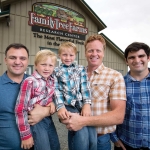
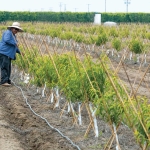
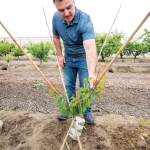
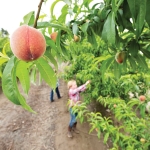
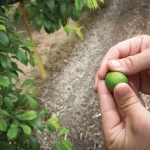


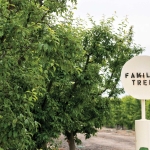





Leave A Comment